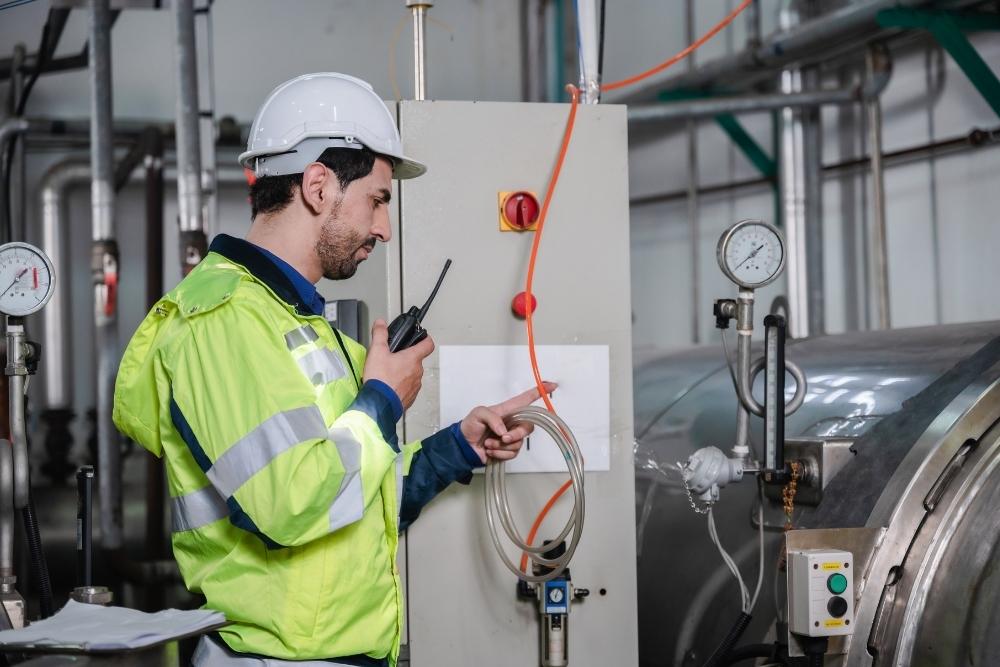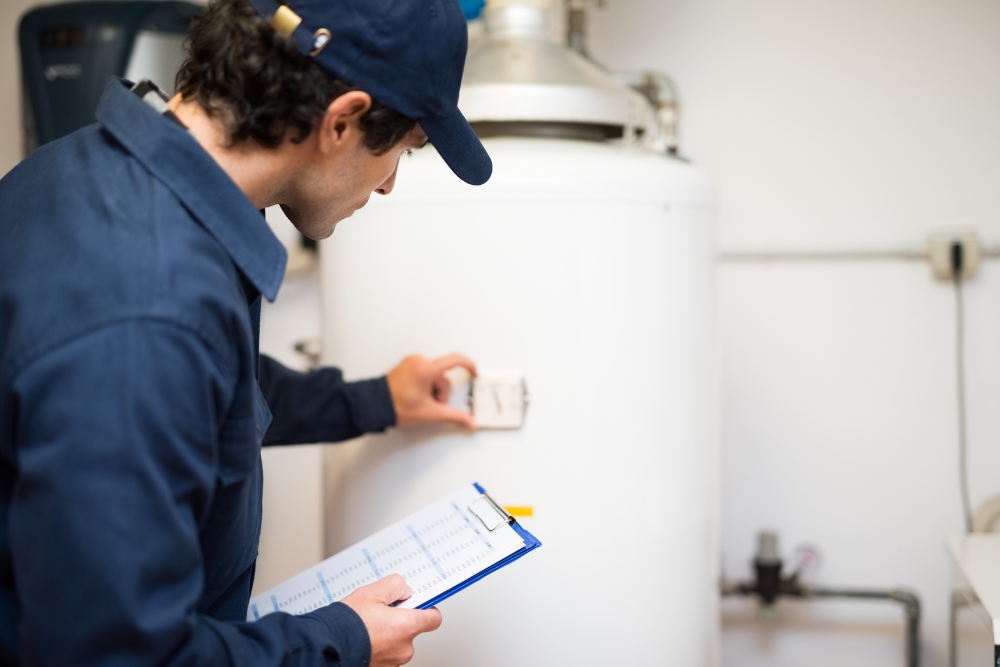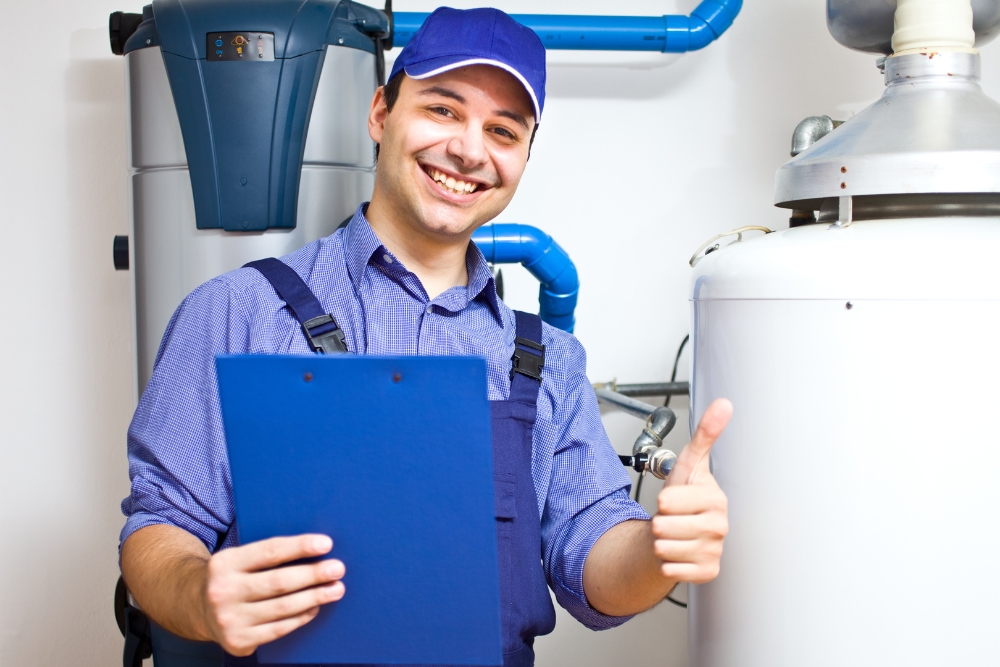Struggling with your hot water system going a bit bonkers and overheating? That’s a common problem many of us have faced down under. More often than not, the real drongo in this situation tends to be a dodgy pressure relief valve.
We’ve done our fair share of research and have come up with several smart strategies for tackling such overheating blues, focusing on maintenance tasks and those tricky repair techniques.
Ready to dive into this hot water headache? Don’t worry mate; you won’t catch any cold while sorting it out!
Key Takeaways
- Adjust thermostat settings to a medium level to prevent overheating and conserve energy.
- Perform regular maintenance tasks such as cleaning the tank and checking for leaks or corrosion.
- Insulate pipes to reduce heat loss and improve the efficiency of your hot water system.
- Reduce water usage by taking shorter showers and fixing any leaks to prevent overheating.
Causes of Hot Water System Overheating
There are several causes of hot water system overheating, including high thermostat settings, malfunctioning thermostats, high mineral content in the water, blocked pressure relief valves, and insufficient water flow.
High thermostat settings
Indeed, high thermostat settings have a major impact on your hot water system. Turning up the heat might seem like an effective way to provide extra hot water but it’s actually one of the leading causes for a system breakdown due to overheating.
If you’re facing constant issues with your hot water, consider managing the thermostat setting more efficiently. Keeping it at a medium level ensures an optimal temperature that doesn’t compromise the functionality of your unit and helps keep energy consumption in check too! Excessively high settings strain critical components like pressure relief valves and burners which could potentially result in costly repairs or unwanted replacements down the line.
Malfunctioning thermostat
If your hot water system is overheating, a malfunctioning thermostat could be to blame. The thermostat is responsible for regulating the temperature of the water in your tank. When it malfunctions, it may not accurately control the temperature and can cause the water to become too hot.
This can lead to scalding hot water, increased energy consumption, and potential damage to your system. It’s important to have a professional plumber check and repair any issues with your thermostat to prevent further problems and ensure that your hot water system operates efficiently.
High mineral content in water
Having high mineral content in your water can contribute to hot water system overheating. Minerals like calcium and magnesium can build up in the pipes and tank, causing blockages and reducing water flow.
This can lead to higher temperatures inside the system, resulting in overheating. Over time, this buildup can also damage the heating elements or burner, leading to inefficiency and potential breakdowns.
Regularly checking for signs of mineral deposits and performing maintenance can help prevent this issue from occurring. Additionally, using a water softener or installing a whole-house filtration system can help reduce mineral buildup and prolong the life of your hot water system.
Blocked pressure relief valve
A blocked pressure relief valve can cause a hot water system to overheat. If the valve is clogged or not functioning properly, it won’t be able to release excess pressure from the tank.
This can lead to increased temperature and pressure inside the system, potentially resulting in overheating. It’s important to have the pressure relief valve checked regularly and repaired if necessary to prevent this issue.
Insufficient water flow
To prevent the hot water system from overheating, it is essential to address the issue of insufficient water flow. When there is not enough water flowing through the system, it can lead to increased heat buildup and potential damage.
One way to tackle this problem is by checking for any clogs or blockages in the pipes and ensuring they are cleared. Another step you can take is to regularly clean and maintain your water tank, as sediment buildup can restrict the flow of water.
By addressing issues related to insufficient water flow, you can help maintain a well-functioning hot water system and avoid unnecessary overheating problems.
Signs of Hot Water System Overheating
- Discoloured or sluggish hot water, indicating a buildup of sediment or minerals in the tank.
- Rumbling or vibrating noises coming from the water heater, suggesting that it is working harder than usual to heat the water.
- Temperature fluctuations, with hot water being too hot one moment and then suddenly turning cold.
- Water leaks or drips around the pressure relief valve, indicating potential overheating and excess pressure in the tank.

Discoloured or sluggish hot water
If you notice that your hot water appears discoloured or is flowing sluggishly, it could be a sign of overheating in your hot water system. This discolouration may indicate a buildup of minerals or sediments in the tank, which can hinder the efficiency and performance of your system.
It’s important to address this issue promptly to prevent further damage and ensure that you have access to clean and reliable hot water.
Rumbling or vibrating noises
If you notice rumbling or vibrating noises coming from your hot water system, it could be a sign of overheating. This occurs when the water inside the tank gets too hot and causes excessive pressure buildup.
The noise is often caused by sediments or minerals that have built up at the bottom of the tank, causing uneven heating and boiling. To fix this issue, you can flush out the tank to remove any sediment buildup and reduce the temperature setting on your thermostat.
Regular maintenance and cleaning can help prevent future overheating and keep your hot water system running smoothly.
Temperature fluctuations
Temperature fluctuations in your hot water system can be a sign of overheating. When the temperature keeps fluctuating, it could indicate an issue with the thermostat or a buildup of mineral deposits inside the system.
These fluctuations can also lead to scalding hot water and potential damage to your plumbing. To address this problem, it’s important to have your thermostat checked and adjusted if needed.
Additionally, regular maintenance and cleaning of your hot water system can help prevent temperature fluctuations and ensure that you have consistent and comfortable water temperatures throughout your home.
Water leaks or dripping
Water leaks or dripping from your hot water system can be a sign of overheating and should not be ignored. Excessive heat can cause pressure buildup, leading to leaks or even bursting pipes.
If you notice any water leaks or dripping around your hot water system, it’s important to address the issue promptly. Check for loose connections or damaged valves that may need tightening or replacement.
Ignoring this problem can lead to further damage and potentially costly repairs. So keep an eye out for any signs of water leaks or dripping and take immediate action to prevent more serious issues.
How To Prevent Hot Water System Overheating
To prevent hot water system overheating, regularly check thermostat settings, perform maintenance tasks, keep the water tank clean and full, insulate pipes, and reduce water usage.
Taking these steps can help you avoid costly repairs and ensure your hot water system operates efficiently. Learn more about these prevention techniques to keep your hot water running smoothly.
Regularly check thermostat settings
To prevent the hot water system from overheating and maintain optimal performance, it is essential to regularly check the thermostat settings. By doing so, you can ensure that the temperature is set at a safe and comfortable level for your needs.
Adjusting the thermostat can also help reduce energy consumption, saving you money on utility bills. Make it a habit to inspect the settings periodically to avoid any potential overheating issues and maintain the efficient operation of your hot water system.
Perform regular maintenance
Performing regular maintenance on your hot water system is crucial to prevent overheating and ensure its optimal performance. By scheduling routine inspections and cleaning, you can identify any potential issues before they escalate into major problems.
Regular maintenance also includes checking the thermostat settings, flushing out sediment from the tank, inspecting for leaks or corrosion, and ensuring proper water flow. Don’t forget to consult with a professional if you’re unsure about any aspect of maintaining your hot water system.
By taking these proactive steps, you can save energy, prolong the lifespan of your system, and avoid costly repairs in the long run.
Keep the water tank clean and full
To prevent the hot water system from overheating, it’s important to keep the water tank clean and full. Regularly inspect your water tank for any sediment or buildup that can accumulate over time.
Sediment can not only affect the efficiency of your hot water system but also contribute to overheating. To clean the tank, drain out all the water and remove any debris or sediment that may have settled at the bottom.
Additionally, make sure to check the fill valve regularly to ensure that it is functioning properly and filling the tank with sufficient water. By keeping your water tank clean and full, you can help maintain proper heat distribution and reduce the risk of overheating in your hot water system.
Insulate pipes
Insulating pipes is a crucial step to prevent hot water system overheating. By adding insulation around your pipes, you can help maintain the temperature of the water and reduce heat loss.
This not only prevents unnecessary energy consumption but also ensures that the hot water reaches your faucets at the desired temperature. Insulating pipes is a simple and cost-effective solution that can significantly improve the efficiency of your hot water system while reducing energy costs.
Reduce water usage
To prevent the hot water system from overheating and conserve energy, it’s important to reduce water usage. This can be done by taking shorter showers, fixing any leaking faucets or pipes, and using efficient appliances that require less water.
By being mindful of our water consumption, we can not only prevent overheating issues but also contribute to a more sustainable and cost-effective household. So let’s make an effort to use water wisely and help keep our hot water systems running smoothly!

Common Mistakes to Avoid When Repairing Hot Water System Overheating
Making these mistakes can worsen your hot water system overheating issues. Read on to learn how to avoid them and effectively repair your system for optimal performance.
Using improper cleaning agents
Using improper cleaning agents to clean your hot water system can lead to severe damage and overheating. It’s important to remember that not all cleaning products are suitable for use on your water heater.
Harsh chemicals or abrasive cleaners can corrode the internal components and cause leaks or malfunctions. Instead, opt for gentle, non-toxic cleaners specifically designed for hot water systems.
Regularly cleaning your water heater with the right products will help prevent mineral buildup and sediment accumulation, ensuring optimal performance and reducing the risk of overheating.
Proper maintenance is crucial for keeping your hot water system in good working condition. By using appropriate cleaning agents, you can avoid unnecessary repairs and extend the lifespan of your water heater.
Not seeking professional help
If you’re experiencing issues with your hot water system overheating, it’s important not to attempt repairs without seeking professional help. Professional plumbers have the expertise and knowledge to properly diagnose and fix the problem, ensuring that it is resolved correctly and safely.
Trying to repair a hot water system on your own can lead to further damage or safety hazards. By calling in a professional, you can have peace of mind knowing that your hot water system will be repaired by someone with the necessary skills and experience.
Not properly securing connections
We need to make sure that when repairing a hot water system, all connections are properly secured. This is crucial because loose or faulty connections can lead to leaks and inefficiency in the system.
By ensuring that all pipes, valves, and fittings are tightly connected, we can prevent any potential leaks from occurring. This will also help maintain optimal water flow and pressure throughout the system, reducing the risk of overheating.
Regularly inspecting and tightening connections is an important part of hot water system maintenance that homeowners should prioritise to avoid costly repairs down the line.
Ignoring potential leaks or issues
Ignoring potential leaks or issues in your hot water system can lead to serious problems down the line. Leaks not only waste water but can also cause damage to surrounding fixtures and structures.
Ignoring leaks may also result in increased energy consumption and higher utility bills. Additionally, if you ignore any signs of issues with your hot water system, such as strange sounds or discoloured water, it could lead to a complete breakdown of the system, leaving you without hot water when you need it most.
Regularly inspecting your system for leaks and addressing any issues promptly is essential for maintaining the efficiency and longevity of your hot water system.
Finding the Right Professional for Hot Water System Repairs
When it comes to finding the right professional for hot water system repairs, there are several steps you can take. Firstly, ask for referrals from friends or family who have recently had their hot water systems repaired.
Secondly, check online reviews of local plumbers to see if they have a good reputation. Thirdly, get quotes from multiple plumbers in your area to compare prices and services offered.
Additionally, consult with a house repairer or maintenance professional who may have recommendations on reliable hot water system repair services. Lastly, consider contacting a professional hot water system repair service that specialises in emergency repairs and offers energy-efficient solutions.
Ask for referrals
We recommend asking for referrals when looking for a professional to repair your hot water system overheating issue. Reach out to friends, family, or neighbours who have faced similar problems and ask if they can recommend a reliable plumber or heating technician.
Referrals from trusted sources can save you time and ensure that you find someone experienced in handling hot water system repairs. Additionally, online reviews and ratings can also provide valuable insights into the quality of service provided by different professionals.
Remember, finding the right person for the job is key to effectively resolving your hot water system overheating problem.
Check online reviews
We highly recommend checking online reviews when looking for a professional to repair your hot water system overheating issue. Reading reviews from other customers can give you valuable insights into the quality of service provided by different plumbers or repair services.
Look for positive reviews that mention prompt and efficient repairs, as well as good customer service. On the other hand, negative reviews might highlight issues such as delays, poor workmanship, or unprofessional behaviour.
By checking online reviews, you can make an informed decision and ensure that you hire someone reliable and trustworthy to fix your hot water system overheating problem.
Get quotes from local plumbers
We highly recommend obtaining quotes from local plumbers when you need to repair your hot water system. By getting multiple quotes, you can compare prices and services to ensure that you are getting the best deal.
Local plumbers are often more accessible and familiar with the specific needs of your area, making them a reliable choice for hot water system repairs. Additionally, seeking quotes from different professionals allows you to gather information on their expertise and experience in handling overheating issues.
Don’t hesitate to reach out and get quotes from local plumbers for efficient and effective repairs!
Consult with a house repairer
If you are experiencing issues with your hot water system overheating, it may be best to consult with a house repairer. A professional can assess the problem and provide expert advice on the necessary repairs or adjustments needed.
They have the knowledge and experience to identify the root causes of overheating, such as a faulty thermostat or blocked pressure relief valve. By consulting with a house repairer, you can ensure that the issue is properly diagnosed and resolved, preventing further damage to your hot water system.
Don’t hesitate to seek professional help when dealing with an overheating problem; it’s always better to address these issues sooner rather than later.
Contact a professional hot water system repair service
If you’re experiencing issues with your hot water system overheating, it’s important to seek professional help. A qualified hot water system repair service can diagnose the problem and provide the necessary repairs or maintenance.
They have the expertise to handle various issues such as faulty thermostats, clogged pressure relief valves, or other components that may be causing the overheating. Don’t hesitate to reach out to a professional who can ensure the proper functioning of your hot water system and prevent any further damage or safety hazards.
Get to Know More about Repair Strategies
In conclusion, managing hot water system overheating requires proactive repairs and prevention strategies. By regularly checking thermostat settings, performing maintenance, and insulating pipes, homeowners can avoid costly issues caused by overheating.
It is also important to seek professional help when needed and not ignore potential leaks or problems. With these repair techniques in place, homeowners can ensure their hot water systems operate efficiently and effectively for years to come.






